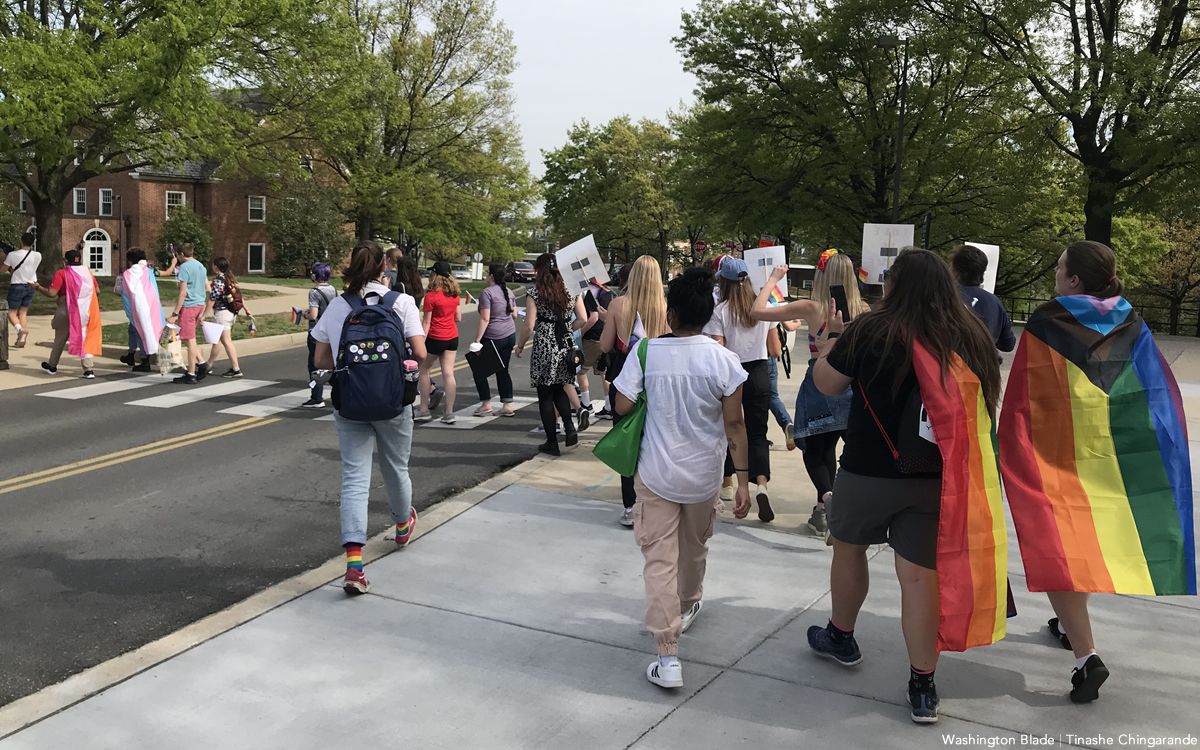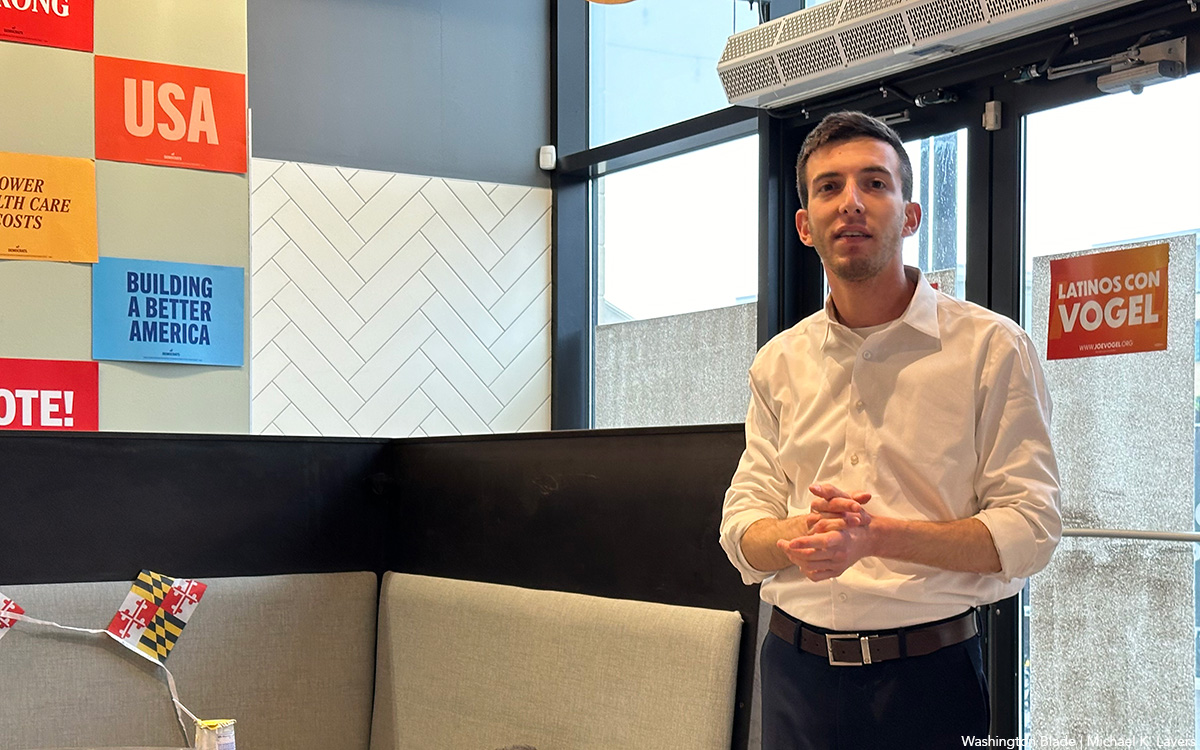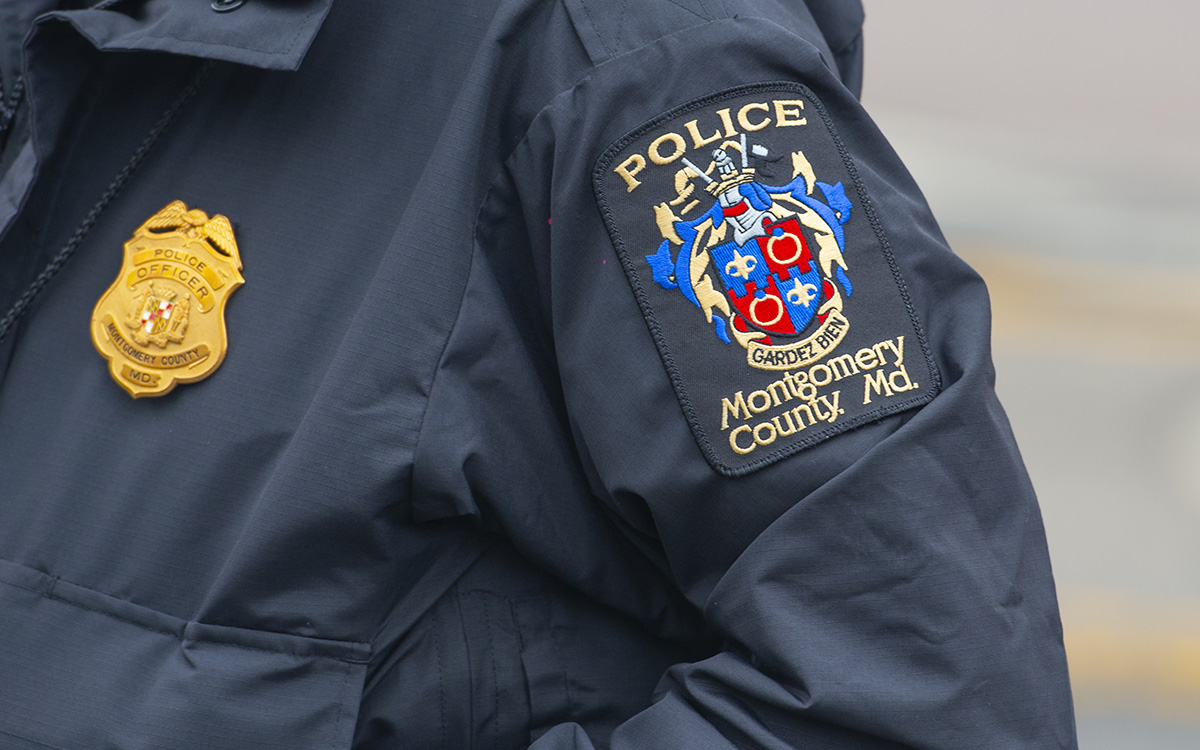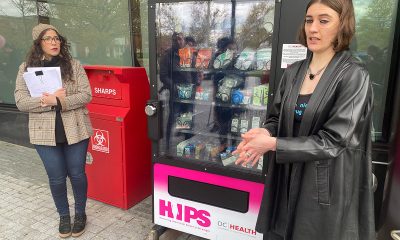Maryland
University of Maryland students march for LGBTQ rights on ‘Maryland Day’
Participants wore Pride flags, waved ‘say gay’ placards

LGBTQ students at the University of Maryland marched across campus Saturday in response to legislation passed in many states that bars the discussion of gender identity and sexual orientation in schools. As this happened, families from across the state were gathered all over campus to celebrate the university’s annual community outreach event, “Maryland Day.”
The “Let’s Say Gay Parade” began in the Adele H. Stamp Student Union, trekked through McKeldin Mall—where many Maryland Day attractions were situated—and ended in the student union. Students, parents and members of the campus community were in attendance.
“For the people who aren’t at this event today, call [and email] your local representatives,” said Veena Aruldhas.
Aruldhas, 23, is a senior studying information science at the university. They are also vice president of the school’s Pride Alliance and also work on the Pride month committee within Multicultural Involvement Community Advocacy, a campus inclusion group.
“Show up for the people who can’t speak for themselves because their rights have been infringed upon,” said Aruldhas.
Legislation aimed at erasing discussions about gender and sexual identity in schools has been on the rise across the country.
Republican Florida Gov. Ron DeSantis signed the controversial “Don’t Say Gay” bill in late March that bans public school teachers from providing instruction about sexual orientation and gender identity in classrooms. The bill also allows parents to sue schools that violate its prescriptions.
Ohio lawmakers also proposed a similar bill in early April that, in addition, limits education about other “divisive concepts” such as the 1619 Project, critical race theory and “any other concept that the state board of education defines as divisive or inherently racist.”
While Maryland legislators this year haven’t launched attacks on classroom instruction like the other two states, recent efforts to provide health equity for transgender individuals through the Trans Health Equity Act were stalled in this year’s General Assembly 90-day legislative session.
Therefore, graduate student Joey Haavik, 26, believes the rise of homophobic legislation around the country escalates the need for Marylanders to review local legislation.
“This didn’t get as much attention,” they said in reference to the Trans Health Equity Act. Haavik is studying international education and policy and works as an advisor to campus LGBTQ organizations. “So, even though people experience many differing levels of hatred, there’s many ways to advocate for our community.”
State Sen. Mary Washington (D-Baltimore City), who attended the event and also gave a keynote speech, spoke on the bill’s failure.
“Events like these empower us to mobilize against attacks on marginalized people in our communities,” she said. “We must be relentless in the fight for a fair and just world.”
House of Delegates candidate Ashanti Martinez also spoke about the bill at the event.
Martinez is a Democrat campaigning for the District 22 seat, and if elected will be the first openly gay Afro-Latino man from Prince George’s County to represent the jurisdiction in the chamber.
“The [bill] vanished … [and] we want to know why,” he said. “This erasure of LGBTQ folks is intentional.”

GAITHERSBURG, Md. — Maryland state Del. Joe Vogel (D-Montgomery County) on Friday held a “Big Gay Canvass Kickoff” event at his congressional campaign’s headquarters.
LGBTQ+ Victory Fund Vice President of Outreach and Engagement Marty Rouse and John Klenert, a member of the DC Vote and Victory Fund Campaign board of directors, are among those who participated alongside members of Equality PAC. Vogel spoke before Rouse, Klenert and others canvassed for votes in the area.
“Joe brings a fresh new perspective to politics,” said Gabri Kurtzer-Ellenbogen, deputy field director for Vogel’s campaign.
Vogel, 27, is among the Democrats running for Congressman David Trone’s seat.
Trone last May announced his bid to succeed retiring U.S. Sen. Ben Cardin (D-Md.) in the U.S. Senate.
The Democratic primary is on May 14. Vogel would be the first Latino, the first gay man and first Gen Zer elected to Congress from Maryland if he were to win in November.
“We need a new generation of leadership with new perspectives, new ideas, and the courage to actually deliver for our communities if we want things to get better in this country,” Vogel told the Washington Blade last month during an interview in D.C.
Maryland
Montgomery County police chief discusses arrest of trans student charged with planned school shooting
County executive tells news conference student’s trans identity is irrelevant to criminal charge

Montgomery County, Md., Police Chief Marcus Jones joined other county and law enforcement officials at a news conference on Friday, April 19, to provide details of the police investigation and arrest of an 18-year-old high school student charged two days earlier with threats of mass violence based on information that he allegedly planed a mass shooting at the high school and elementary school he attended in Rockville, Md.
In charging documents and in a press release issued on April 18, Montgomery County Police identified the arrested student as “Andrea Ye, of Rockville, whose preferred name is Alex Ye.”
One of the charging documents states that a friend of Ye, who police say came forward as a witness who played a crucial role in alerting authorities to Ye’s threats of a school shooting, noted that Ye told the witness that Ye identified as the transgender student he wrote about as a character in a 129-page manifesto outlining plans for a school shooting. Police have said Ye told them the manifesto was a fictional story he planned to publish.
At the news conference on Friday, Police Chief Jones and other law enforcement officials, including an FBI official and Montgomery County Executive Marc Elrich, referred to the student as Alex Ye and Mr. Ye. None of the officials raised the issue of whether Ye identified as a transgender man, seven though one of the police documents identifies Ye as a “biological female.”
County Executive Elrich appeared to express the views of the public officials at the news conference when one of the media reporters, during a question-and-answer period, asked Elrich why he and the others who spoke at the news conferment failed to “admit that this individual was transgender.”
“Because it’s not a lead,” Elrich replied, asking if the press and law enforcement authorities should disclose that someone arrested for murder is “a white Christian male who’s heterosexual.” Elrich stated, “No, you don’t – You never publish somebody’s sexual orientation when we talk about this. Why you are focusing on this being a transgender is beyond me. It’s not a news story. It is not a crime to be transgender.”
The reporter attempted to respond but was cut off by the press conference moderator, who called on someone else to ask the next question.
In his remarks at the press conference Chief Jones praised the so far unidentified witness who was the first to alert authorities about Ye’s manifesto appearing to make threats of a mass school shooting.
“Now, this is a situation that highlights the critical importance of vigilance and community involvement in preventing potential tragedies,” Jones said. “I commend the collaborative efforts of the Montgomery County Police Department, the Federal Bureau of Investigation, the Rockville City Police Department, and the Montgomery County Public Schools, as well as Montgomery County Health and Human Services,” he told the gathering.
“Thanks to their swift action and cooperation a potentially catastrophic event was prevented,” Jones said.
Jones pointed out that during the current school year, police have received reports of 140 threats to the public schools in Montgomery County. He said after a thorough investigation, none of them rose to the level where an arrest was made. Instead, police and school officials took steps to arrange for the student making the threats and their parents to take remedial action, including providing mental health services.
“But this case is different,” Jones said. “This case is entirely different that takes it to a different level. It was a concerned witness who brought this matter to light by rereporting the suspect’s manifesto to the authorities. This underscores the value of community engagement and the ‘see something say something’ approach,” he said.
Jones mentioned at the press conference that Ye was being held without bond since the time of his arrest but was scheduled to appear in court for a bond hearing on Friday shortly after the press conference took place to determine whether he should be released while awaiting trial or continue to be held.
In his manifesto obtained by police, Ye writes about committing a school shooting, and strategizes how to carry out the act. Ye also contemplates targeting an elementary school and says that he wants to be famous.
In charging documents reported on by WJLA 7 and WBAL 11, the 129-page document, which Ye has referred to as a book of fiction, included writings that said, in part:
“I want to shoot up a school. I’ve been preparing for months. The gun is an AR-15. This gun is going to change lives tomorrow … As I walk through the hallways, I cherry pick the classrooms that are the easiest targets. I need to figure out how to sneak the gun in. I have contemplated making bombs. The instructions to make them are surprisingly available online. I have also considered shooting up my former elementary school because little kids make easier targets. High school’s the best target; I’m the most familiar with the layout. I pace around my room like an evil mastermind. I’ve put so much effort into this. My ultimate goal would be to set the world record for the most amount of kills in a shooting. If I have time, I’ll try to decapitate my victims with a knife to turn the injuries into deaths.”
Maryland
Rockville teen charged with plotting school shooting after FBI finds ‘manifesto’
Alex Ye charged with threats of mass violence

BY BRETT BARROUQUERE | A Montgomery County high school student is charged with what police describe as plans to commit a school shooting.
Andrea Ye, 18, of Rockville, whose preferred name is Alex Ye, is charged with threats of mass violence. Montgomery County Police and the FBI arrested Ye Wednesday.
The rest of this article can be found on the Baltimore Banner’s website.
-

 South America4 days ago
South America4 days agoDaniel Zamudio murderer’s parole request denied
-

 Maryland5 days ago
Maryland5 days agoMontgomery County police chief discusses arrest of trans student charged with planned school shooting
-

 State Department22 hours ago
State Department22 hours agoState Department releases annual human rights report
-

 Theater4 days ago
Theater4 days ago‘Amm(i)gone’ explores family, queerness, and faith











